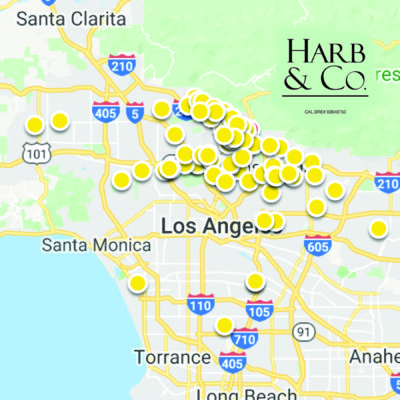Los Angeles Probate Sales a Simple Guide
Los Angeles Probate sales involve handling an estate when someone, such as a family member or other loved one, passes. Probate ensures that outstanding creditors are paid and assets appropriately distributed to heirs and descendants.
Probate real estate is complex, so hiring a real estate expert experienced in probate sales is wise. The legal process begins with a “petition” (request) to open the Estate and formally name a personal representative responsible for administrating the deceased’s property. An Official Notice of Creditors is printed in a local newspaper, and a Notice of Administration is sent to other involved parties. Creditors then have a set amount of time to file their claims based on the date of first publication. The personal representative then pays debts and distributes the remaining Estate. Finally, a discharge petition is filed, and the Estate is closed.
Click here to learn why you should hire a Realtor experienced in probate sales.
This is a straightforward overview of Los Angeles probate sales, a complex legal process. You should engage the services of a skilled attorney who specializes in Los Angeles probate sales. You may also be encouraged to consult with a CPA or tax consultant upon your attorney’s recommendation.
Probate – First 3 Months
- File original wills and codicils (executor must petition for probate within 30 days or may lose the right to be executor)
- Publish Notice of Petition to Administer Estate (3 times before hearing date, 1st publishing must be at least 15 days before the hearing)
- Mail Notice of Petition to Administer Estate (at least 15 days before the hearing)
- File proof of publication and proof of mailing “Notice of Petition to Administer Estate.”
- If required, file proof of the will and check calendar notes at least two days before the hearing.
- File Order for Probate and, if required, probate bond
Letters of Administration are issued – at the same time or after filing an order for probate. Now you are in a position to hire Harb & Co.
Next 4 – 5 Months
- Apply for Employer Identification Number
- Notify the Director of Health Services
- Open Estate Bank account
- Arrange for the preparation of income tax returns
- Prepare inventory & appraisals and send them to the Referee
- Mail Notice of Administration to creditors, pay debts without requiring formal claims
- File approval or Rejection of formal Creditor Claims
- File Inventory and Appraisals with the court
- List property for sale with Realtor®, who specializes in probate sales, and begin to market and sell the property.
- File petition for Confirmation of Property Sale if no IAEA (Independent Administration of Estates Act) Administrator.
- Attend court hearing for overbids when no IAEA Administrator
- File change in Ownership Statement with county assessor for all real property
- File federal estate tax return if gross Estate evaluates at $675,000 or more
Final Month – Closing Estate
- File Petition for Final Distribution
- Mail Notice of Hearing to heirs and beneficiaries
- File proof of mailing Notice of Hearing
- File Order for Final Distribution
- Transfer assets and obtain receipts
- File Receipts and Affidavit for Final Discharge
Intestate Succession
The following attempts to simplify how separate property is distributed when one dies without a will.
If there is a surviving spouse but no surviving children, parents, brothers, or sisters:
-
-
- All to the surviving spouse
-
With a surviving spouse and one surviving child:
-
-
- 1/2 to the surviving spouse
- 1/2 to child
-
If there is a surviving spouse and more than one surviving child:
-
-
- 1/3 to the surviving spouse
- 2/3 to children
-
If there is not a surviving spouse and no children, but there is a parent(s):
-
-
- All to parents
-
Where there is no surviving spouse or children and no parents:
-
-
- All to siblings
-
If there is not a surviving spouse, the preferential order of distribution:
-
- Children
- Parents
- Parent’s children
- Grandparents
- Children of grandparents
- Children of the predeceased spouse
- Next of kin
- Parents of the predeceased spouse
- Children of parents of the predeceased spouse
- State of California

Overbids
Some probate sales require court confirmation of the sale. At the time of the confirmation hearing, another buyer may overbid the original buyer. Typically overbids are offered at the hearing verbally. At the consummation of the confirmation hearing, the successful over-bidder must execute the bid in writing. Usually, at this time, the buyer must present a 10% deposit.
There is a statutory formula for the first overbid. It is an additional amount equal to 10% or more on the first $10,000 and 5% on the amount of the original bid over $10,000.
For example:
Original bid = $100,000
First, overbid must be 10% of 10,000 = + 1,000
5% of $90,000 = + 4,500
Overbid must be = $105,500
If the court receives an acceptable overbid, the court will ask for any additional overbids. The judge will usually establish minimum increments for additional overbids. All overbids will be taken into account based on the gross amount (without taking into account any brokerage fees).
The above is a simplification of a very complex procedure. Only an attorney can provide legal advice. Find detailed information in Sections 6400-6413 of the California Probate Code.
Related Post: What is a probate sale
This content is copyrighted and may be used only with a direct link to this real estate website.




